i'm building ecommerce web app using nuxt and node.js/express. when i'm building locally i have no problem making axios api calls. base url is configured as the following
const baseDomain = 'http://localhost:8080/';
then all i do is
async getProducts({ commit }, payload) {
const reponse = await Repository.get(
`${baseUrl}/products?${serializeQuery(payload)}`
)
.then(response => {
commit('setProducts', response.data);
return response.data;
})
.catch(error => ({ error: JSON.stringify(error) }));
return reponse;
},
now the problem is when i move my whole app to digital ocean, i tried the following changes
const baseDomain = 'https://0.0.0.0:8080/';
my nuxt.js config
export default {
ssr: false,
head: {
titleTemplate: 'Lokazz',
title: 'Lokazz',
meta: [
{ charset: 'utf-8' },
{
name: 'viewport',
content: 'width=device-width, initial-scale=1'
},
{
hid: 'description',
name: 'description',
content:
'Lokazz'
}
],
link: [
{
rel: 'stylesheet',
href:
'https://fonts.googleapis.com/css?family=Work+Sans:300,400,500,600,700&subset=latin-ext'
}
]
},
css: [
'swiper/dist/css/swiper.css',
'~/static/fonts/Linearicons/Font/demo-files/demo.css',
'~/static/fonts/font-awesome/css/font-awesome.css',
'~/static/css/bootstrap.min.css',
'~/assets/scss/style.scss'
],
plugins: [
{ src: '~plugins/vueliate.js', ssr: false },
{ src: '~/plugins/swiper-plugin.js', ssr: false },
{ src: '~/plugins/vue-notification.js', ssr: false },
{ src: '~/plugins/axios.js'},
{ src: '~/plugins/lazyLoad.js', ssr: false },
{ src: '~/plugins/mask.js', ssr: false },
{ src: '~/plugins/toastr.js', ssr: false },
],
buildModules: [
'@nuxtjs/vuetify',
'@nuxtjs/style-resources',
'cookie-universal-nuxt'
],
styleResources: {
scss: './assets/scss/env.scss'
},
modules: ['@nuxtjs/axios', 'nuxt-i18n','vue-sweetalert2/nuxt', '@nuxtjs/auth-next', "bootstrap-vue/nuxt"],
bootstrapVue: {
bootstrapCSS: false, // here you can disable automatic bootstrapCSS in case you are loading it yourself using sass
bootstrapVueCSS: false, // CSS that is specific to bootstrapVue components can also be disabled. That way you won't load css for modules that you don't use
},
i18n: {
locales: [
{ code: 'en', file: 'en.json' },
],
strategy: 'no_prefix',
fallbackLocale: 'en',
lazy: true,
defaultLocale: 'en',
langDir: 'lang/locales/'
},
router: {
linkActiveClass: '',
linkExactActiveClass: 'active',
},
server: {
port: 8080, // default: 3000
host: '0.0.0.0' // default: localhost
/// this one works fine , the digital ocean support team told me to do this.
},
auth: {
strategies: {
local: {
token: {
property: "token",
global: true,
},
redirect: {
"login": "/account/login",
"logout": "/",
"home": "/page/ajouter-produit",
"callback": false
},
endpoints: {
login: { url: "/login", method: "post" },
logout: false, // we don't have an endpoint for our logout in our API and we just remove the token from localstorage
user:false
}
}
}
},
};
package.json file
{
"name": "martfury_vue",
"version": "1.3.0",
"description": "Martfury - Multi-purpose Ecomerce template with vuejs",
"author": "nouthemes",
"private": true,
"scripts": {
"dev": "nuxt",
"build": "nuxt build",
"start": "nuxt start",
"generate": "nuxt generate"
},
"config": {
"nuxt": {
"host": "0.0.0.0",
"port": "8080"
}
},
}
server index.js config
const express = require('express');
const bodyParser = require('body-parser');
const mongoose = require('mongoose')
const cors = require('cors');
const url = 'mongodb+srv://****************************' // this works fine i manage to pull data from the cluster without a problem
const jwt = require('jsonwebtoken')
mongoose.connect(url, {useNewUrlParser:true}).then(()=>{
const app = express();
// middlleware
app.use(express.json())
app.use(cors());
//products routes
const products = require('./product/product.router');
app.use('/', products)
//users routes
const users = require('./user/user.router');
app.use('/', users)
const port = process.env.PORT || 8080;
app.listen(port, () => console.log(`Server started on port ${port}`));
}).catch(error => console.log(error.reason));
const con = mongoose.connection
con.on('open', () => {
console.log('connected...')
})
here's my github repo and file structure. the server and api folder is lokazz_api.
